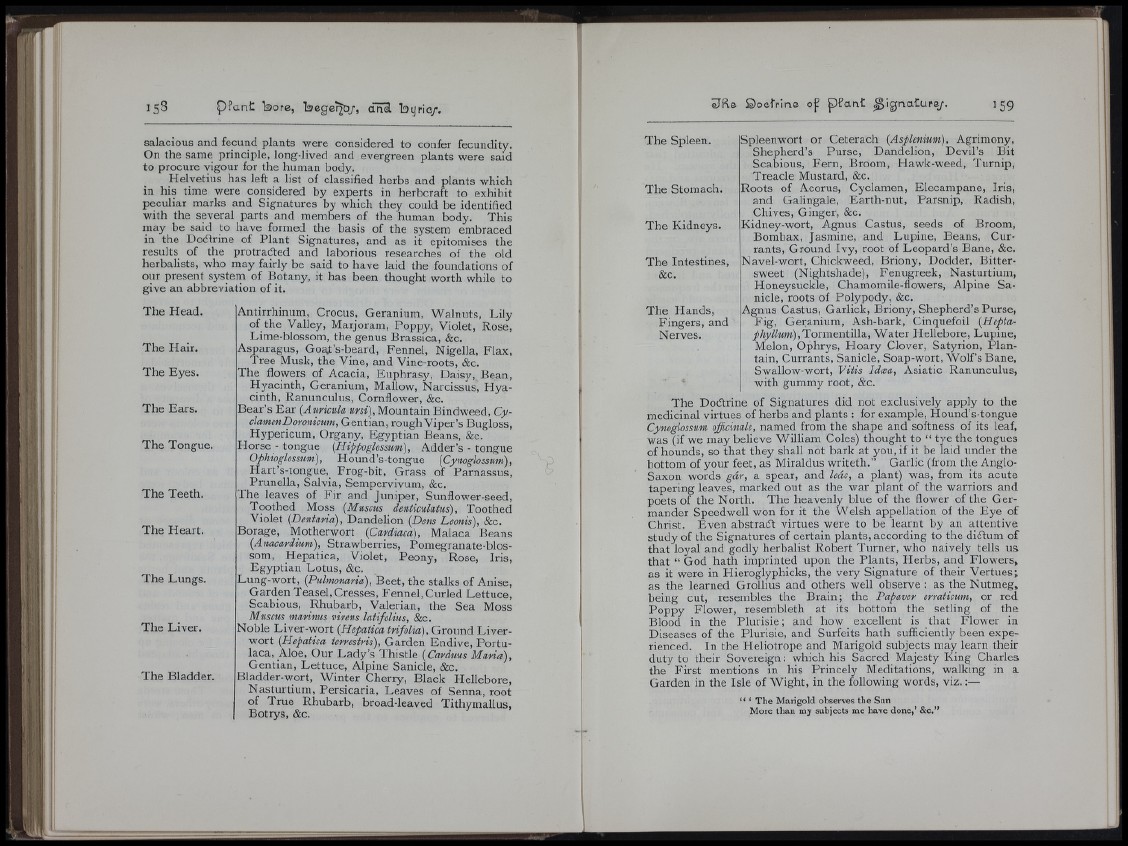
' M
i ' I
salacious and fecund plants were considered to confer fecundity.
On the same principle, long-lived and evergreen plants were said
to procure vigour for the human body.
Helvetius has left a list of classified herbs and plants which
in his time were considered by experts in herbcraft to exhibit
peculiar marks and Signatures by which they could be identified
with the several parts and members of the human body. This
may be said to have formed the basis of the system embraced
in the Doifirine of Plant Signatures, and as it epitomises the
results of the protracfied and laborious researches of the old
herbalists, who may fairly be said to have laid the foundations of
our present systeni of Botany, it has been thought worth while to
give an abbreviation of it.
The Head.
The Hair.
The Eyes.
The Ears.
The Tongue.
The Teeth.
The Heart.
The Lungs.
The Liver.
The Bladder.
Antirrhinum, Crocus, Geranium, Walnuts, L ily
of the Valley, Marjoram, Poppy, Violet, Rose,
Lime-blossom, the genus Brassica, &c.
Asparagus, Goa.t’s-beard, Fennel, Nigella, Flax,
Tree Musk, the Vine, and Vine-roots, &c.
The flowers of Acacia, Euphrasy, Daisy, Bean,
Hyacinth, Geranium, Mallow, Narcissus, Hyacinth,
Ranunculus, Cornflower, &c.
Bear’s Ea r [Auricula ursi), Mountain Bindweed, Cyclamen
Doronicum, Gentian, rough Viper’s Bugloss,
Hypericum, Organy, Egyptian Beans, &c.
Horse - tongue [Hippoglossum), Adder’s - tongue
Ophioglossum), Hound’s-tongue [Cynogiossum),
Hart’s-tongue, Frog-bit, Grass of Parnassus,
Prunella, Salvia, Sempervivum, &c.
The leaves of F ir and Juniper, Sunflower-seed,
Toothed Moss [Muscus denticulatus), Toothed
Violet [Dentaria), Dandelion [Dens Leonis), &c.
Borage, Motherwort [Cardiaca], Malaca Beans
[Anacardium), Strawberries, Pomegranate-blos-
som. Hepática, Violet, Peony, Rose, Iris,
Egyptian Lotus, &c.
Lung-wort, [Pulmonaria), Beet, the stalks of Anise,
Garden Teasel, Cresses, Fennel, Curled Lettuce,
Scabious, Rhubarb, Valerian, the Sea Moss
Muscus marinus virens latifolius, &c.
Noble Liver-wort [Hepática trifolia), Ground L iv e rwort
[Hepática terrestris), Garden Endive, Portu-
laca. Aloe, Our L ad y ’s Thistle [Carduus Maria),
Gentian, Lettuce, Alpine Sanicle, &c.
Bladder-wort, Winter Cherry, Black Hellebore,
Nasturtium, Persicaria, Leaves of Senna, root
of True Rhubarb, broad-leaved Tithymallus,
Botrys, &c.
The Spleen.
The Stomach.
The Kidneys.
The Intestines,
&c.
The Hands,
Fingers, and
Nerves.
Spleenwort or Ceterach [Asplénium), Agrimony,
Shepherd’s Purse, Dandelion, Devil’s Bit
Scabious, Fern, Broom, Hawk-weed, Turnip,
Treacle Mustard, &c.
Roots of Acorus, Cyclamen, Elecampane, Iris,
and Galingale, Earth-nut, Parsnip, Radish,
Chives, Ginger, &c.
Kidney-wort, Agnus Castus, seeds of Broom,
Bombax, Jasmine, and Lupine, Beans, Currants,
Ground Ivy, root of Leopard’s Bane, &c.
Navel-wort, Chickweed, Briony, Dodder, Bittersweet
(Nightshade), Fenugreek, Nasturtium,
Honeysuckle, Chamomile-flowers, Alpine S a nicle,
roots of Polypody, &c.
Agnus Castus, Garlick, Briony, Shepherd’s Purse,
Fig, Geranium, Ash-bark, Cinquefoil [Hepta-
phyllum),Tonnent'ûla, Water Hellebore, Lupine,
Melon, Ophrys, Hoary Clover, Satyrion, Plantain,
Currants, Sanicle, Soap-wort, Wolf’s Bane,
Swallow-wort, Vitis Idaa, Asiatic Ranunculus,
with gummy root, &c.
The Docfirine of Signatures did not exclusively apply to the
medicinal virtues of herbs and plants : for example, Hound’s-tongue
Cynogiossum officinale, named from the shape and softness of its leaf,
was (if we may believe William Coles) thought to “ tye the tongues
of hounds, so that they shall not bark at you, if it be laid under the
bottom of your feet, as Miraldus writeth.” Garlic (from the Anglo-
Saxon words gcir, a spear, and leâc, a plant) was, from its acute
tapering leaves, marked out as the war plant of the warriors and
poets of the North. The heavenly blue of the flower of the Germander
Speedwell won for it the Welsh appellation of the Eye of
Christ. Even abstrait virtues were to be learnt by an attentive
study of the Signatures of certain plants, according to the diitum of
that loyal and godly herbalist Robert Turner, who naively tells us
that “ God hath imprinted upon the Plants, Plerbs, and Flowers»
as it were in Plieroglyphicks, the very Signature of their Vertues;
as the learned Grollius and others well observe: as the Nutmeg»
being cut, resembles the Brain; the Papaver erraticum, or red
Poppy Flower, resembleth at its bottom the setling of the
Blood in the Plurisie; and how excellent is that Flower in
Diseases of the Plurisie, and Surfeits hath sufficiently been experienced.
In the Heliotrope and Marigold subjects may learn their
duty to their Sovereign: which his Sacred Majesty King Charles
the First mentions in his Princely Meditations, walking in a
Garden in the Isle of Wight, in the following words, viz.:—
“ * The Marigold observes the Sun
More than my subjects me have done/ &c,”